Since the launch of the Plastic-free campaign in 2016 in Hong Kong, Greenpeace has initiated plastics source reduction incentives among stakeholders from individuals, communities to corporates and the government. What changes have you accomplished with Greenpeace? Let’s wind back to 6 years from now.
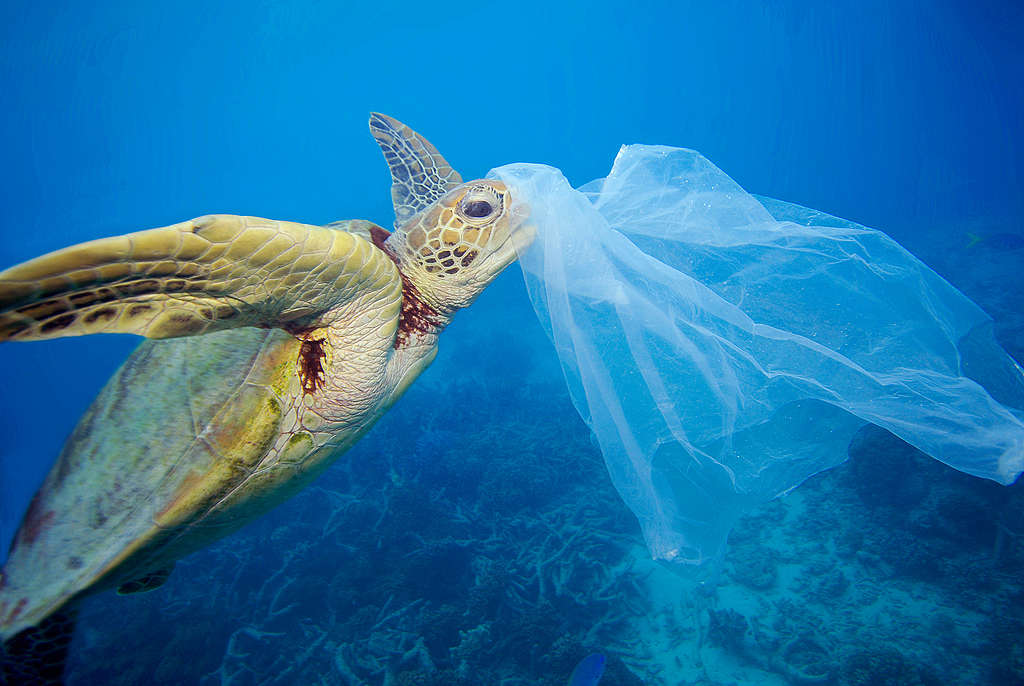
2016: Plastic-free campaign kicks off…
What resembles a plastic bag floating in the sea? You bet! A jellyfish! No wonder seabirds and marine lives mistake them for the daily food they feed on. This is how the tragedy begins. The Plastics in Seafood report Greenpeace issued in 2016 disclosed microplastics were found in bodies of over 170 species of marine creatures, including seafood Hong Kong people consume every day such as mullet, mussel and lobster[1].
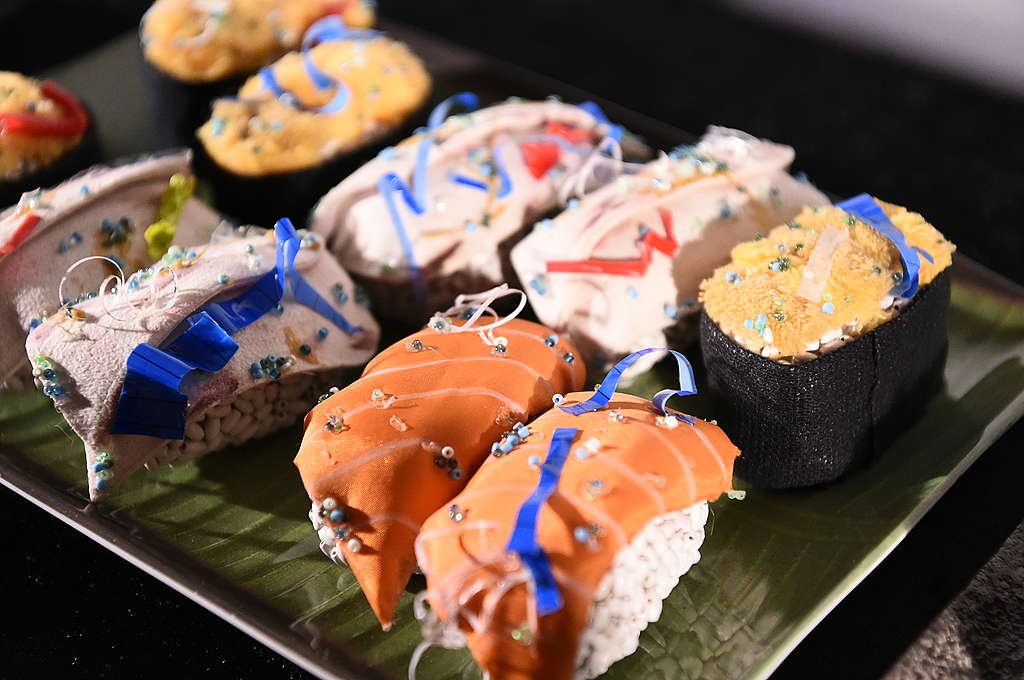
In the same year, Greenpeace discovered numerous loopholes in microplastics phase-out measures 30 major cosmetics and body care companies adopted. To arouse public awareness of the issue, we launched an online petition[2]. Your support rewarded us with promising responses from key chain retailer stores in Hong Kong, including Watsons and 759 Store, which announced their gradual shelving-off of microplastics-made cosmetic and body care products such as facial cleansers and body scrubs.
2017: We need no plastics deliveries
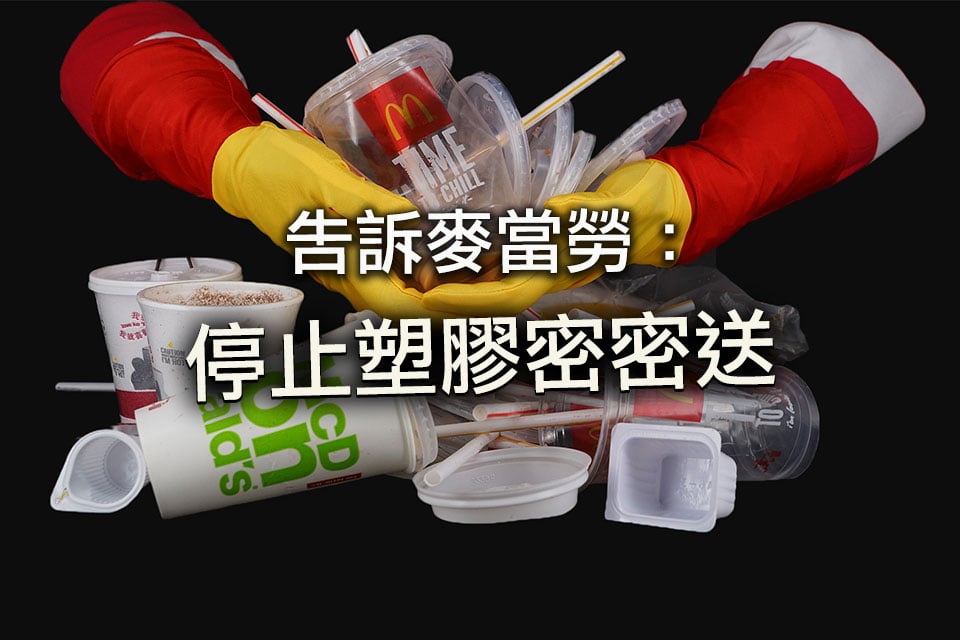
Greenpeace coordinated volunteers for a field survey at 240 chain stores of McDonald’s[3] and found that within a 2-hour lunch session, 202,800 plastic utensils were dispatched. These plastic products could pile up to height equivalent to a total of 72 International Financial Centres in Hong Kong. The plastic deliveries issue is acute. Greenpeace concluded one crucial move towards accomplishing the plastic reduction initiatives: to engage the leading corporates in changing their business operation model. Only when they start reducing plastic usage, could we efficiently reduce plastic disposals from its source.
Thanks to the 15,000+ signed supporters for our plastic reduction campaign. Backed up with your support, our voices reached the discussion table at the McDonald’s headquarters. Further to our ongoing Plastic-free campaign, McDonald’s announced phasing out of foam plastic containers and packaging and replacing McFlurry plastic cups with paper cups by the third quarter of 2018. This year, it also launched a “day-day-no-straw” policy.
2018: Fast-food industry, time to go plastic-free!
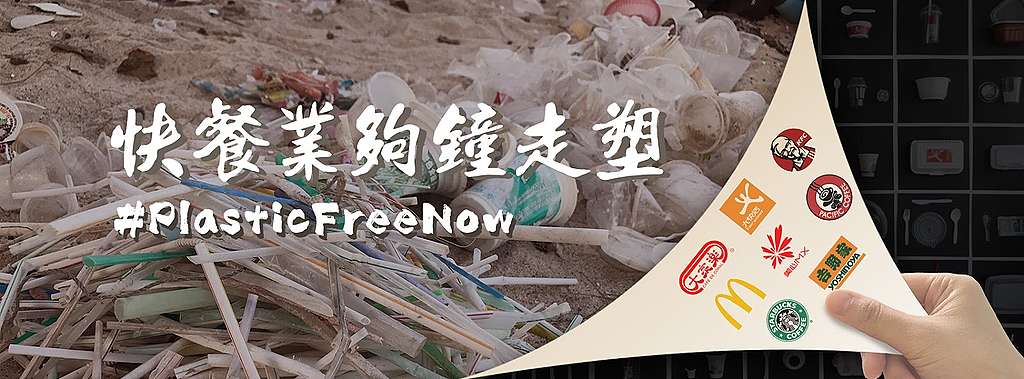
We extended our target from McDonald’s to 7 other big local fast-food restaurants including Café de Coral, Fairwood, KFC, Maxim’s, Pacific Coffee, Starbucks, and Yoshinoya. Our survey found that among 6 of the studied fast-food chains, each dispatched an average of over 490 million plastic products in a year!
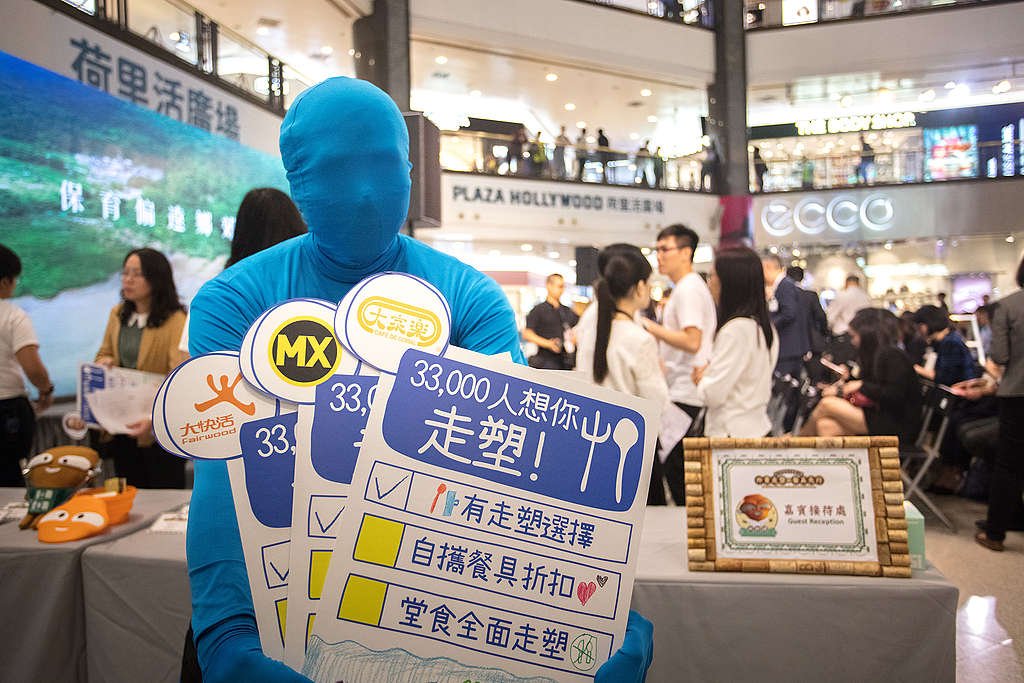
Over 50,000 citizens supported our petition to the 8 big local fast-food chains in Hong Kong for implementing concrete plastic-free measures. Our series of go plastic-free actions include hand-delivering: the public’s signed the plastic-free petition to senior management at shareholder meetings of Café de Coral and Fairwood, and “THE plastic-free list” to 3 fast-food chains. In return, we gained the following promises from the big fast-food chains in plastic-usage reduction:
- KFC stopped offering plastic lids and straws for its dine-in services
- Maxim’s announced it no longer provided straws for cold drinks (except special drinks) for dine-ins
- Pacific Coffee stopped giving out single-use straws and utensils for take-aways
- Café de Coral launched 3 plastic reduction policies, i.e. “day-day no straws”, no initiation for single-use plastic knife offering, and replacing plastic stirring rods for hot drinks with wood stirring rods
- Fairwood announced several plastic reduction measures, e.g. no offering of straws from November, and radical phase-out of plastic straws
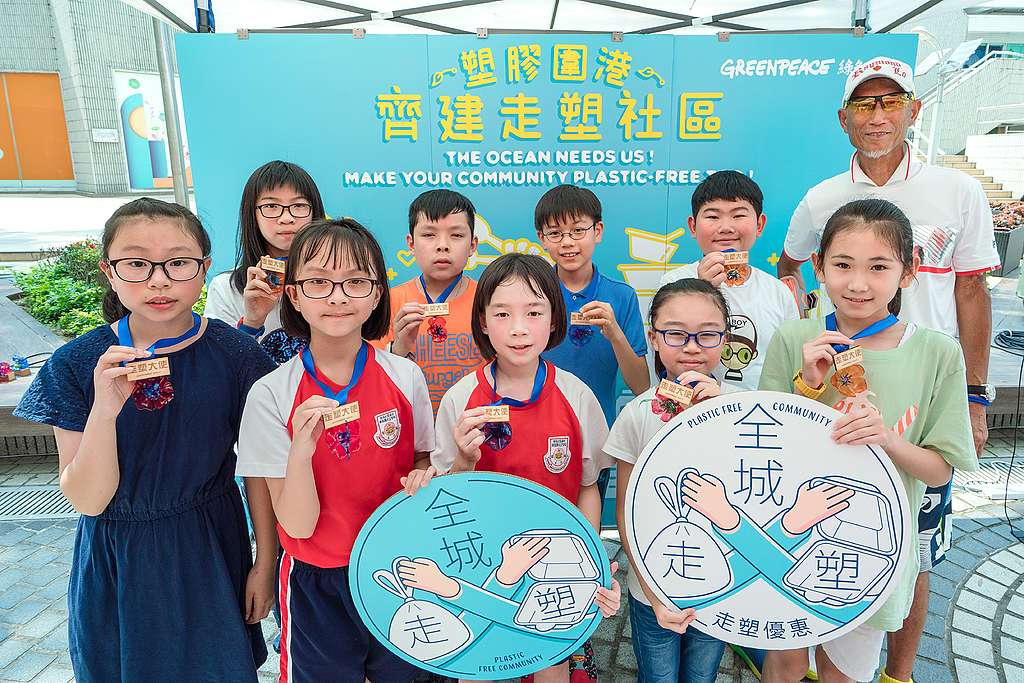
To address the public’s demand for plastic-free choices, Greenpeace initiated an “In Search for Plastic-free eateries” program. 150 participating volunteers encouraged restaurants to go plastic-free with us. By the end of 2018, over 370 restaurants agreed to join the campaign. In 2019, we launched the “Plastic Free Community” Campaign, extending our invitation of reducing single-use plastics to community shops at districts and wet markets. Over half of the community shops in Shatin [4] decided to go plastic-free.
2019: Supermarkets urged to unwrap our groceries
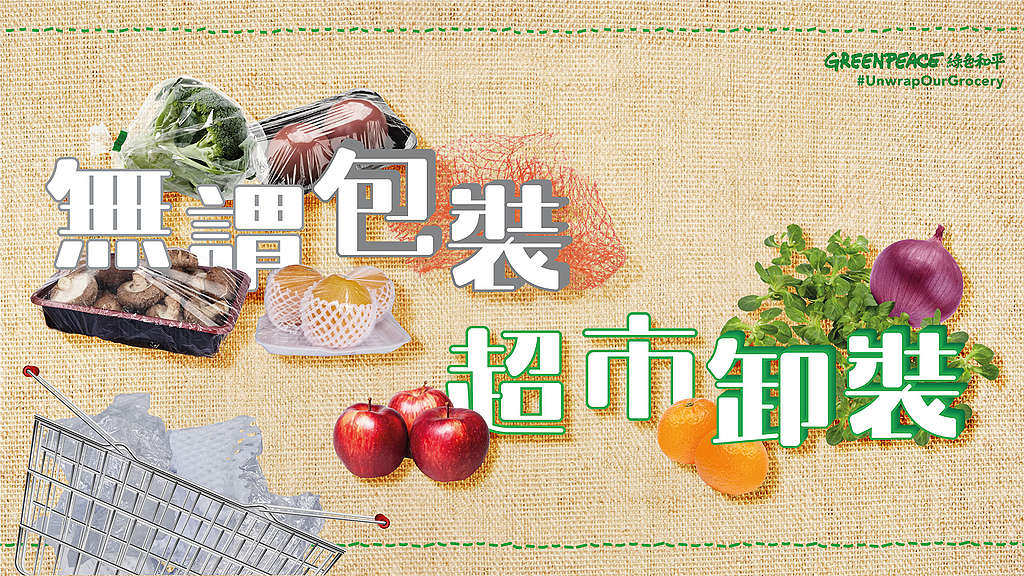
According to then published research, it is estimated above 176 tonnes of plastics flew from rivers to seas in Hong Kong every year. The results share similar findings to our report issued last year, in which 112 tonnes of plastic wraps (64%) were found in water samples we collected from local rivers. In response to the plastic pollution issue, we set our plastic-free objectives to supermarkets, a sector that is the main contributor to excessive plastic wrapping and appealed to supermarket chains including Yata, ParknShop, Wellcome, AEON, City’super, Fusion, International, Market Place by Jasons, and Taste.
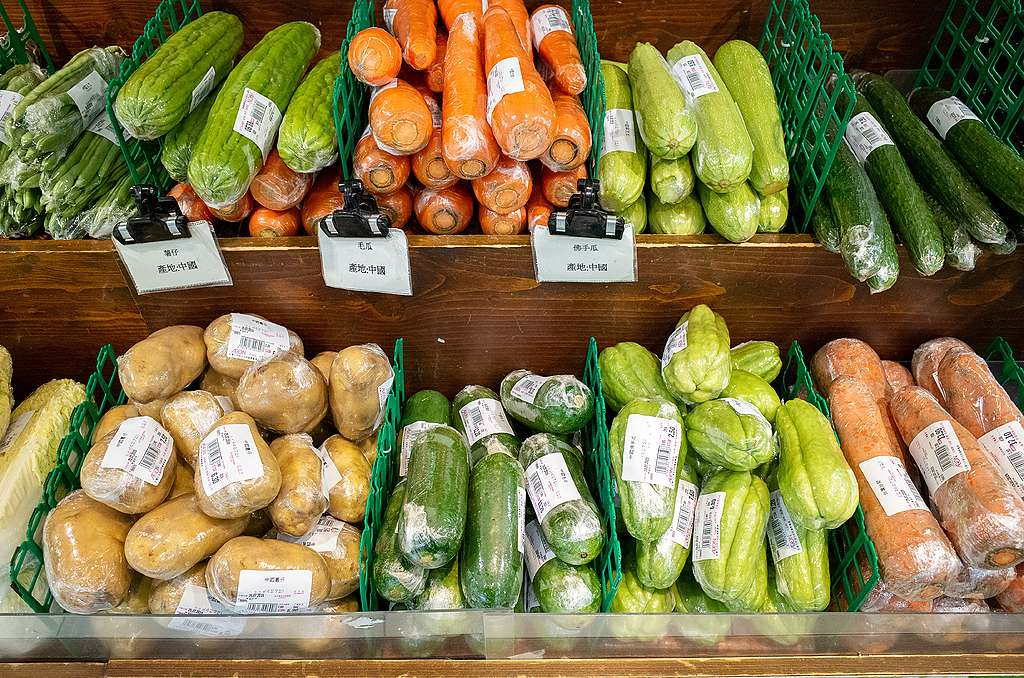
The Greenpeace survey revealed over 52% out of 84% of single-use plastic wraps in supermarkets were added on by supermarkets themselves. Since our plastic-free campaign was extended to supermarkets,15,000 people joined it through various activities in 5 months. Supporters signed on our petitions, enrolled in the citywide supermarket investigation team, took part in the “Supermarket Plastic Collection Contest”, and outreached community shops to go plastic-free in our plastic-free community campaign.
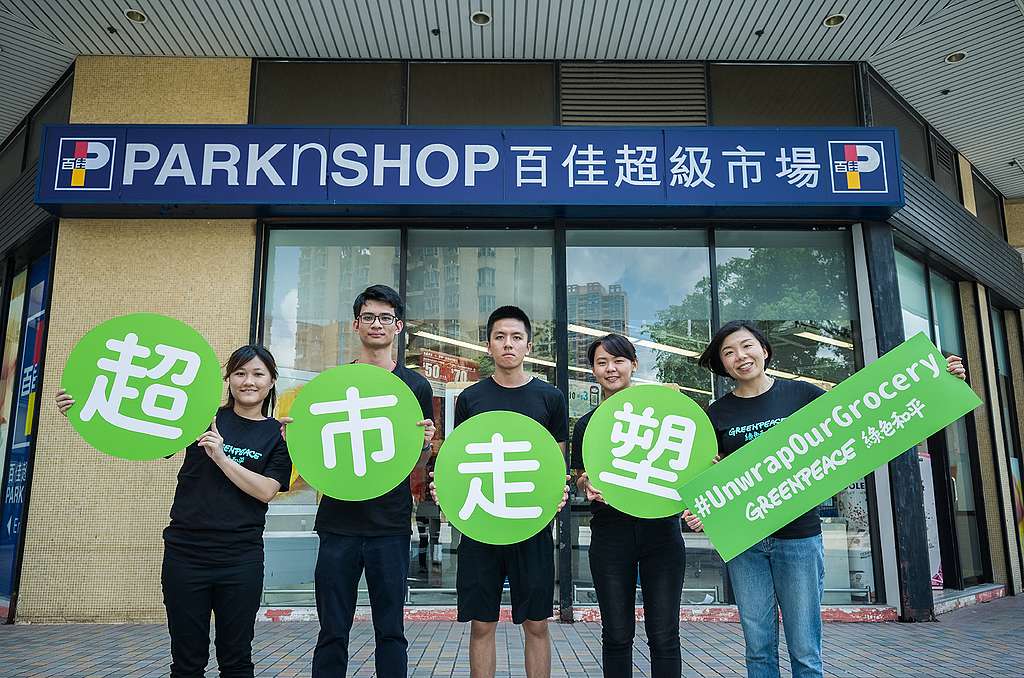
Backed with your support, ParknShop takes a step forward and pilot runs unwrapped fruits and veggies, and it decided to expand naked-packaging to more branches. Above 30,000 plastics were reduced as a result.
In October, Greenpeace hosted the first multi-stakeholder forum in Asia on exploring plastic-free solutions for supermarkets in Hong Kong. Local supermarket representatives from ParknShop, Wellcome and Yata, Didier Onraita, the founder of French plastic-free chain supermarket Day by Day, a delegate of the UK consulting firm Anthesis, and the science team from Greenpeace took part to exchange experiences and practical business models at the summit.
Good news came after the conference – Great, a high-end supermarket subsidiary of the A.S. Watson Group, became the first-ever big local supermarket operating in a “naked-packaging retail” business model and set up a “naked-packaging refill station”. Other supermarket representatives have been working towards their plastic reduction plans. This year was also the first year when the Hong Kong SAR Government Policy Address mentioned plastic waste reduction, mapping out its plan to collaborate with the retail industry for plastic-free promotion.
2020: The league of fights: covid, plastic-free actions, wastes import control
Pandemic outbreaks increased healthcare wastes. Greenpeace issued a comprehensive report grading Hong Kong supermarket’s plastic reduction efforts: “Plastic at the checkout: How Hong Kong Supermarkets Rank on Plastic”. We found that most supermarkets failed us. Supermarket giants A.S. Watson Group (ParknShop) and Dairy Farm (Wellcome) were making slow progress. Unnecessary plastic wraps were no help to our covid-fights (Greenpeace youtube video) and could not justify the overpackaging issue found at our supermarkets. We lined up passionate and creative catering business owners at our online sharing sessions, through which their successful plastic-free practice messages could be spread among the public.
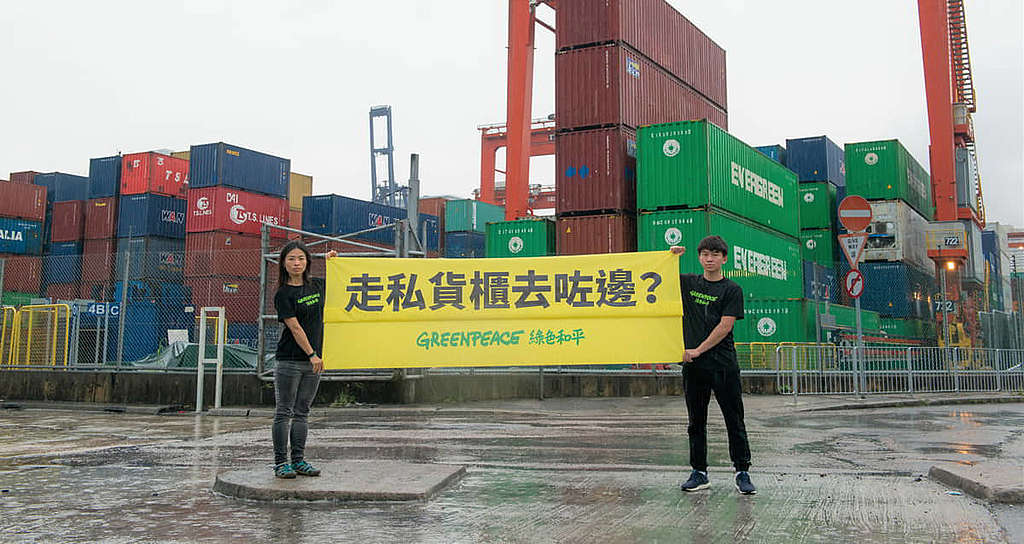
How could the city accommodate overseas wastes when it has yet to develop solutions to handle local plastic wastes? As an international port for exchange, Hong Kong has been preyed upon to be a checkpoint where wastes get stuck inbound, adding burden to the local landfills. Greenpeace’s Hong Kong Office worked with its South-East Asian and Italian offices to investigate this issue. In 2019, we boarded in Malaysia and reported its “waste mountains” pollution problem. We also tracked down illegal waste returns to Hong Kong in cargos and requested the authorities for a detailed investigation. Consequently, the Environmental Protection Department issued “Guidelines on Import and Export Control of Waste Plastics” and reinforced stricter regulations from January 1, 2021.
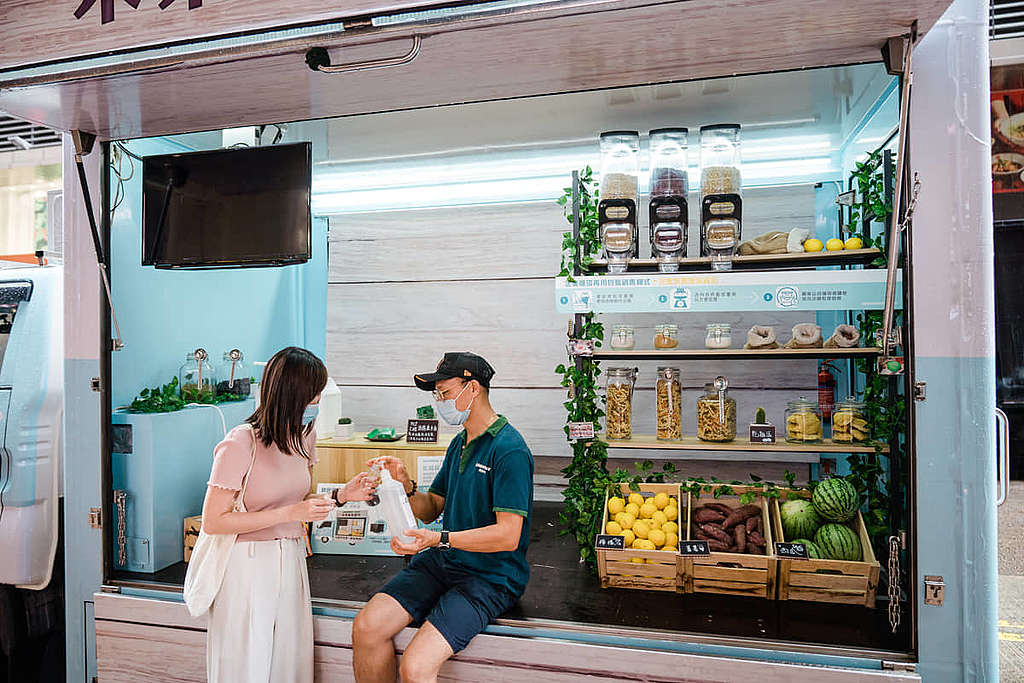
To push our city to go Plastic Free, it is not a matter for hard-core green lovers only, it needs community support to optimize its effects. In this connection, Greenpeace invited Hong Kong artists to share their green visions to promote the plastic-free concept in the community. Joey Leung, a well-known foodie and cooking master, demonstrated how a festive plastic-free meal could be prepared for the Mothers’ Day celebration, showing love and care in the community. Bonde Sham was cast in a series of green mystery-unveiling video clips for us, so that green practice could be more of a practical lifestyle than a legend. In social media, over 300 responses hit the #TuesPlasticFree challenge, reflecting promising feedback to our Campaign. “Plastic-free popup store“ introduced naked-packaging experiences to the general public in different districts. Both online and offline, going plastic-free has become chic!
2021: Over 1,100 shops pledge plastic-free, reduction of single-use tableware on the way
Over 1,100 shops committed to going plastic-free by the end of 2021, a target number we had set for ourselves earlier on. “Plastic-Free Hunts” were conducted 6 times on a roll this year, along with 4 plastic-free workshops. Thanks to all participants, including volunteers, shop owners who provided green incentives, and those who joined and supported our activities. The reusable tablewares community experiment, “For Rental Please”, was conducted in Lo Tak Court, Tsuen Wan last year. An accumulated count of 1,470 single-use plastic tableware was saved in the 2 experiments of the year.
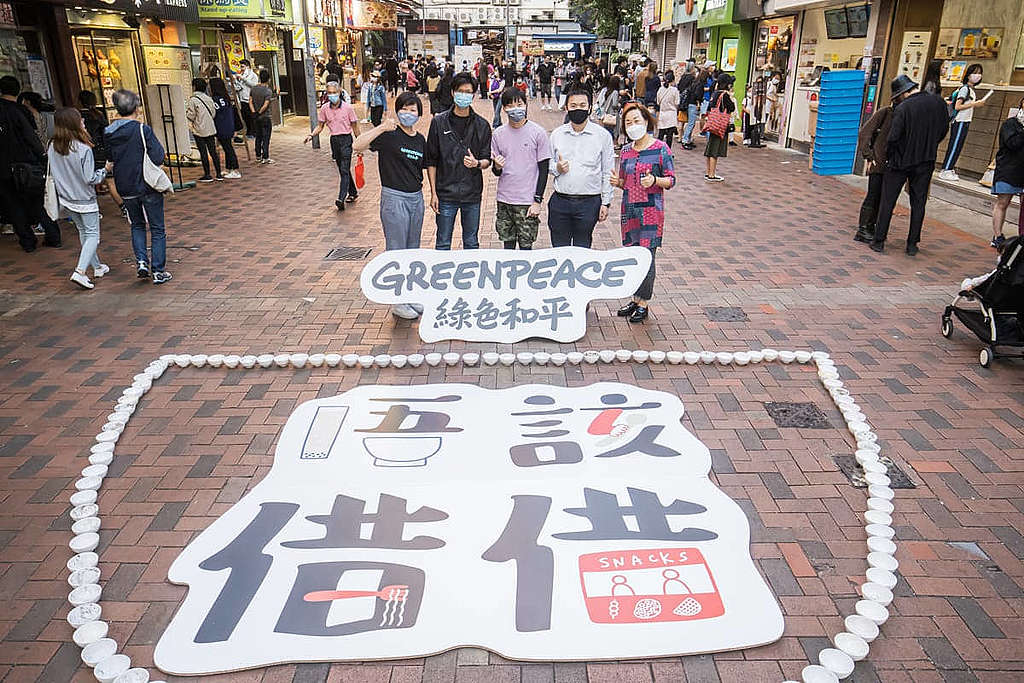
Various plastic reduction policy consultations were imposed in 2021, one of which included our long-advocated control on single-use plastic tableware. In concerted efforts with many environmental protection organizations and 5,000 signed supporters in Hong Kong, we urged the government to implement a complete ban on disposable plastic tableware by 2025. In July, we completed the first microplastics quantity investigation survey in Hong Kong rural rivers, showing evidence of microplastic invasion to local rivers. Indeed, the city can tolerate no further delay in addressing the plastic pollution issue. Going plastic-free is the only solution.
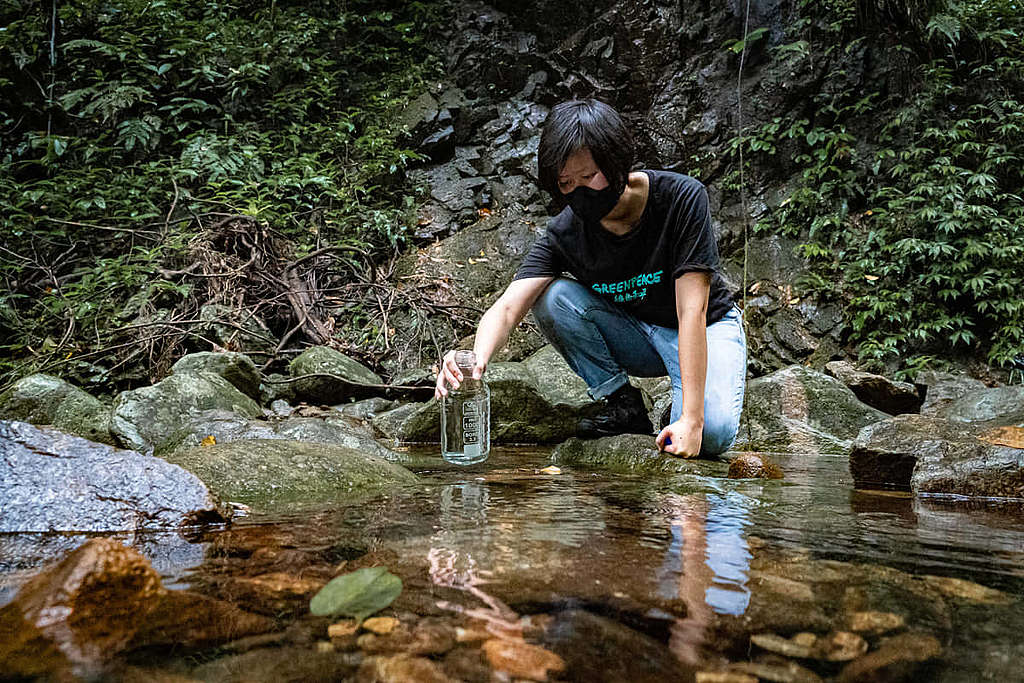
Thanks to over 24,000 supporters for our plastic-free petition, ParknShop heard our voices. It announced 6 concrete plastic-free promises 2030, including expansion of “naked-packaging refill stations”, “plastic-free grocery zone”, etc. Since the inception of the Plastic Free Supermarket Campaign, over 38,000 signatures have been collected. Your continued support will speed up plastic-free actions by supermarkets, and widen the extent of plastic-free measures.
Looking Ahead in 2022
Reviewing the changes we have made together, Greenpeace is much motivated to keep up our green initiatives in the year ahead.
Our objectives of the Plastic-free Campaign in 2022 are set out as follows:
- To advocate the government to ban the single-use plastic tableware by 2025 and invest in the development of reusable tableware alongside its policy implementation
- To investigate the health concerns plastics have posed to the people, through scientific studies and sample analysis
- To persuade big local corporates to shoulder the social responsibility on reduction of plastic production and plastic footprint
- To organize a series of community experiments and activities on plastic-free green living, share minimal lifestyle through handbooks and seminars
- To provide the public with solid and feasible directions on plastic reduction practice, so that we can prove and show plastic-free possibilities in our lives
- To consolidate our collaboration with plastic-free shops, review the performances of community work and plastic-free actions
- To urge the government and corporates to propose active plastic-free measures by providing them with concrete solutions
We can’t accomplish these objectives alone. We look forward to accomplishing another height with you through our plastic-free actions of the year.
NOTES (Media coverage on Greenpeace’s Plastic-free campaign):
[1] https://www.scmp.com/news/hong-kong/health-environment/article/1986226/mussels-lobsters-and-oysters-microplastic
[2] https://www.cosmeticsdesign-asia.com/Article/2016/11/09/Greenpeace-on-microplastics-and-labelling
[3] https://www.scmp.com/news/hong-kong/health-environment/article/2125325/mcdonalds-tops-hong-kong-fast-food-chain-list-most
[4] https://www.scmp.com/news/hong-kong/health-environment/article/3024133/greenpeace-scheme-aims-turn-hong-kong-plastic
[5] https://www.scmp.com/news/hong-kong/health-environment/article/3032870/hong-kongs-supermarkets-explore-plastic-free
